AIFA Prof Ann Kupa Food Allergy Research Grant
Chief Investigator: A/Prof Rachel Peters, Murdoch Children's Research Institute (MCRI), Melbourne
Research Team: A/Prof Jennifer Koplin (University of Queensland), Dr Vicki McWilliam (MCRI, Royal Children's Hospital), Dr Victoria Soriano, Prof Mimi Tang and Ms Megan Mathers (MCRI)
 Melbourne has the highest prevalence of food allergy internationally, affecting 10% of 1-year-old infants and 4.5% of adolescents. Since there is no cure for food allergies in Australia, effective prevention strategies are important in reducing the impact of this common condition. Currently, the recommended prevention strategy at the population level is the early introduction of allergenic foods (such as peanut butter), based on positive results from clinical trials for peanut allergy.
Melbourne has the highest prevalence of food allergy internationally, affecting 10% of 1-year-old infants and 4.5% of adolescents. Since there is no cure for food allergies in Australia, effective prevention strategies are important in reducing the impact of this common condition. Currently, the recommended prevention strategy at the population level is the early introduction of allergenic foods (such as peanut butter), based on positive results from clinical trials for peanut allergy.
In school-age children, cashew allergy is just as prevalent and severe as peanut allergy but is less likely to be outgrown. Research into effective prevention strategies for cashew allergy is severely lacking and much less is known about the natural history of cashew allergy compared to peanut allergy. Our EarlyNuts study revealed that while 87% of infants were consuming peanuts by the age of 1, only 25% were eating cashews. This highlights the need for public health messages that encourage the early introduction of cashews alongside peanuts.
Our study, EarlyNuts, has shown a significant shift in infant feeding practices over the past decade, with infants being introduced to solid foods earlier and consuming high-calorie foods like eggs and nuts at a younger age and in larger quantities. It is important that we assess whether changing infant feeding practices for food allergy prevention has not had unintended consequences health outcomes, such as growth and obesity.
To do this, the study is conducting a longitudinal follow-up of 1933 infants who were initially recruited at 12 months of age. When these children reach the age of 6, they will undergo assessments to test for food allergy and measure their growth. This project will describe the prevalence and natural history of cashew allergy to age 6 years, assess whether changing infant feeding practices was effective at preventing cashew allergy and assess any potential impact on other health outcomes.

MCRI Team: from left to right are Grace Darling, Megan Mathers, Victoria Soriano, Rachel Peters, Claire Hogan, Koulla Dionisiou and Isobel Hincapie Gallego


 Cow’s milk allergy is the most common allergy in early childhood and is increasingly reported as a trigger of severe anaphylaxis. Resolution rates are high, however for those with persistent allergy or until resolution occurs, milk avoidance can pose a significant burden on families and impact growth and nutrition. Up to 85% of those with IgE-mediated milk allergy can tolerate baked milk. Baked milk tolerance status is often established to allow inclusion of foods containing baked milk as this is known to improve quality of life and may assist with tolerance induction to whole milk.
Cow’s milk allergy is the most common allergy in early childhood and is increasingly reported as a trigger of severe anaphylaxis. Resolution rates are high, however for those with persistent allergy or until resolution occurs, milk avoidance can pose a significant burden on families and impact growth and nutrition. Up to 85% of those with IgE-mediated milk allergy can tolerate baked milk. Baked milk tolerance status is often established to allow inclusion of foods containing baked milk as this is known to improve quality of life and may assist with tolerance induction to whole milk. Effective communication is crucial for our immune system to function normally. When a virus invades our body, our immune cells have to be able to receive warning signals communicated from other cells, so that they can respond promptly and efficiently to protect our body. When communication is disrupted, a person can get life-threatening or fatal viral infections. A genetic form of such communication disruption, affecting a crucial receptor of warning signals, is called IFNAR1 deficiency.
Effective communication is crucial for our immune system to function normally. When a virus invades our body, our immune cells have to be able to receive warning signals communicated from other cells, so that they can respond promptly and efficiently to protect our body. When communication is disrupted, a person can get life-threatening or fatal viral infections. A genetic form of such communication disruption, affecting a crucial receptor of warning signals, is called IFNAR1 deficiency.  Chronic diseases involving strict dietary adherence have been associated with an increased risk of eating disorders (EDs). Our recent systematic review suggested that eating disorders may be more prevalent in individuals with food allergy compared to those without. Eating disorders have an increased risk of premature mortality, a high personal and economic burden and lengthy delays in diagnosis and treatment. However, research is limited exploring risk factors for eating disorders in those living with food allergy. This project aims to identify predictive as well as modifiable factors that increase the risk of eating disorders in individuals with food allergy. This will be the first survey of its kind and will provide valuable insights into factors that can help identify individuals at a higher risk of eating disorders.
Chronic diseases involving strict dietary adherence have been associated with an increased risk of eating disorders (EDs). Our recent systematic review suggested that eating disorders may be more prevalent in individuals with food allergy compared to those without. Eating disorders have an increased risk of premature mortality, a high personal and economic burden and lengthy delays in diagnosis and treatment. However, research is limited exploring risk factors for eating disorders in those living with food allergy. This project aims to identify predictive as well as modifiable factors that increase the risk of eating disorders in individuals with food allergy. This will be the first survey of its kind and will provide valuable insights into factors that can help identify individuals at a higher risk of eating disorders. Anaphylaxis is a rapid and severe reaction affecting many parts of the body that can be life-threatening. It is usually caused by allergy to triggers that are familiar such as peanuts or certain medications. Idiopathic cases (where there is no identifiable external allergenic trigger) represent 30-60% of adult presentations. Idiopathic anaphylaxis is a difficult diagnosis for patients to live with as a trigger cannot be avoided, making further events unpredictable.
Anaphylaxis is a rapid and severe reaction affecting many parts of the body that can be life-threatening. It is usually caused by allergy to triggers that are familiar such as peanuts or certain medications. Idiopathic cases (where there is no identifiable external allergenic trigger) represent 30-60% of adult presentations. Idiopathic anaphylaxis is a difficult diagnosis for patients to live with as a trigger cannot be avoided, making further events unpredictable. Diseases of the immune system that attack itself are known as autoimmune diseases. In Australia, these are quite common (affecting around 1 in 12 people) and can range from affecting a single organ (e.g., the pancreas in type 1 diabetes) to the entire body (e.g., lupus). The origins of autoimmune diseases are still poorly understood and as such, treatments are non-specific and may lead to significant acute and chronic long-term side-effects. These diseases are characterised by blood biomarkers known as autoantibodies – proteins that can “attack” the body’s own proteins.
Diseases of the immune system that attack itself are known as autoimmune diseases. In Australia, these are quite common (affecting around 1 in 12 people) and can range from affecting a single organ (e.g., the pancreas in type 1 diabetes) to the entire body (e.g., lupus). The origins of autoimmune diseases are still poorly understood and as such, treatments are non-specific and may lead to significant acute and chronic long-term side-effects. These diseases are characterised by blood biomarkers known as autoantibodies – proteins that can “attack” the body’s own proteins.
 Inborn errors of immunity are genetic conditions that cause those affected to have a dysfunctional immune system. This can lead to problems such as susceptibility to infection, allergy and autoimmunity.
Inborn errors of immunity are genetic conditions that cause those affected to have a dysfunctional immune system. This can lead to problems such as susceptibility to infection, allergy and autoimmunity.